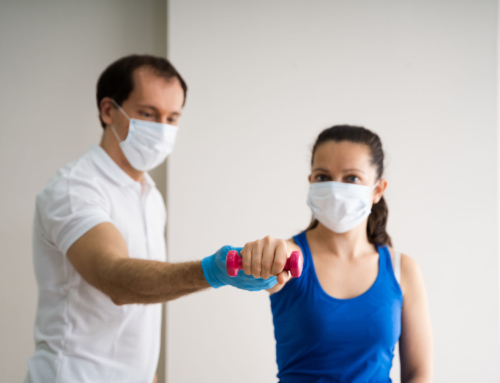 Ashley Sloan PT, DPT is a Board-Certified Clinical Specialist in Orthopedic Physical Therapy helping patients get back to doing what they love at our City Base West location. She spared a few minutes of her busy schedule to tell us about her passion for Physical Therapy (PT) and some of the myths about PT.
Ashley Sloan PT, DPT is a Board-Certified Clinical Specialist in Orthopedic Physical Therapy helping patients get back to doing what they love at our City Base West location. She spared a few minutes of her busy schedule to tell us about her passion for Physical Therapy (PT) and some of the myths about PT.
“As a physical therapist, I get to be a healthcare provider, a coach, a partner and a friend—it is such a privilege to be able to help others get back to doing what they love with whom they love!”
What certifications do you have / what do you specialize in?
I am an Orthopedic Clinical Specialist (OCS). I became a specialist following a rigorous 14 months in residency and training and passing a national board exam. Less than 7% of physical therapists in the U.S. hold a board certification. I specialize in treating musculoskeletal dysfunctions that are seen in outpatient clinics. I love getting to work in a community-based clinic where I get to meet all sort of people of different ages, backgrounds, cultures and with a variety of injuries. I particularly enjoy treating neck and back pain, headaches, jaw pain, shoulder pain and chronic pain. I also am certified in Level 1 and 2 Dry Needling.
Where does your passion for PT come from?
I wanted to become a physical therapist after my own bout with chronic pain and headaches in high school. I saw a number of practitioners, but it was PT that was most helpful. PT is so great because it is active and puts power in the patient’s hands to overcome their own conditions. Being a physical therapist is about being a partner and a coach in addition to prescribing treatment and exercise.
What are some non-clinical skills you feel that you’ve developed from being a physical therapist?
Communication–it is so important to be able to listen to a patient. Not just about their pain or condition, but to hear what is between the lines. This can include values, perspective, worries and concerns, past experiences, expectations, hopes, goals and beliefs. I’ve even used some of the strategies I’ve learned when communicating with patients in my friendships and relationships with my spouse and family.
What advice would you give to someone going to PT?
Most of our patients in Physical Therapy have pain. Not all pain is threatening, dangerous, damaging or the result of pathology. This being said, sometimes pain can be those things. I like to tell people to check in with their bodies and use a “red, yellow, green light” scale for what they are going through. “Green” is minimal pain or “feeling the burn” when exercising. It is safe and tolerable and resolves when the activity is over. “Yellow” is more of a moderate pain that may worsen as the activity continues. This is the cue to rest and let it resolve before continuing with the activity. (An example might be increased back pain with walking more than 10 minutes, but a 1 minute rest break allows the person to walk another 10 minutes.). “Red” is severe pain, sharp or stabbing pain that is increasing and doesn’t calm down for a long time when the activity is stopped. “Pain is gain” or “pain is weakness leaving the body” is bologna. Some pain is OK and normal, some isn’t. We shouldn’t avoid all discomfort and pain out of fear, but neither should we seek severe pain. Helping patients find a balance is my job, as well as helping progress activities out of the “red light” into “green”.
What are common myths about PT in general?
That PT stands for “physical torture”! Physical therapists have a passion to help people get out of pain, restore function and get back to a healthy life and fun activities. Most of the times, this myth comes from friends and family members describing their recovery after a surgery. Of course, pain is a normal part of recovery from surgery, but physical therapists goal is to make the transition toward health and function easier, faster and more comfortable.
Another myth is that PT is only for people who have had surgeries. In an outpatient setting, we do PT for all sorts of conditions that don’t require surgery and to prevent surgery. Most of the time, proper rehab of the back, neck, shoulders and knees can completely remove the need for surgery, even in cases of arthritis, disc bulges/injuries, degeneration and tears.
What are some ways that athletes could do to avoid sports related injuries?
- Cross train
- Wear a helmet when applicable
- Do not play with symptoms of a concussion
- Train in the off season
- If you’ve been injured in the past, rehab fully before returning to a sport to prevent re-injury.
If you are having pain, ask your doctor if Physical Therapy is right for you. Are in the San Antonio area? Call or visit any of our 12 Momentum Physical Therapy locations and we will get you the help you need.





